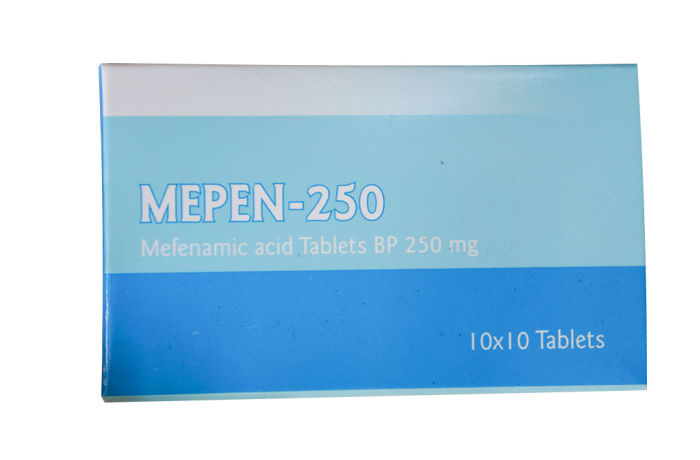
Mephen - 250 Mefenamic acid tablets
Further information
Usual Adult Dose for Pain:
- Initial dose: 500 mg orally once
- Following initial dose: 250 mg orally every 6 hours as needed
- Duration of therapy: Usually not to exceed 1 week
- Use: For the relief of acute pain
Usual Adult Dose for Dysmenorrhea:
- Initial dose: 500 mg orally once
- Following initial dose: 250 mg orally every 6 hours as needed
- Duration of therapy: 2 to 3 days
Note: Treatment should begin at the onset of bleeding and associated symptoms.
For the treatment of primary dysmenorrhea
Usual Pediatric Dose for Pain:
14 years or older:
Initial dose: 500 mg orally once
Following initial dose: 250 mg orally every 6 hours as needed
Duration of therapy: Usually not to exceed 1 week
For the relief of acute pain
Usual Pediatric Dose for Dysmenorrhea:
14 years or older:
Initial dose: 500 mg orally once
Following initial dose: 250 mg orally every 6 hours as needed
Duration of therapy: 2 to 3 days
Caution:
- Mefenamic acid can increase your risk of fatal heart attack or stroke, especially if you use it long term or take high doses, or if you have heart disease. Do not use mefenamic acid just before or after heart bypass surgery (coronary artery bypass graft, or CABG).
- Follow all directions on your prescription label. Your doctor may occasionally change your dose to make sure you get the best results. Do not take mefenamic acid in larger amounts or for longer than recommended. Use the lowest dose that is effective in treating your condition.
How to use Mefenamic Acid
Read the Medication Guide provided by your pharmacist before you start using mefenamic acid and each time you get a refill. If you have any questions, consult your doctor or pharmacist.
- Take this medication by mouth, usually 4 times a day with a full glass of water (8 ounces or 240 millilitres) or as directed by your doctor. Do not lie down for at least 10 minutes after taking this drug. If stomach upset occurs, take this medication with food or milk. Do not take mefenamic acid with antacids unless directed by your doctor. Certain antacids may change the amount of mefenamic acid absorbed by the body.
- Dosage is based on your medical condition and response to therapy. To reduce your risk of stomach bleeding and other side effects, take this medication at the lowest effective dose for the shortest possible time. Do not increase your dose, take it more frequently, or take it for a longer time than prescribed. This medication usually should not be taken for more than 7 days at a time.
- If you are taking this drug on an "as needed" basis (not on a regular schedule), remember that pain medications work best if they are used as the first signs of pain occur. If you wait until the symptoms have worsened, the medicine may not work as well.
- If you are using this medication for painful periods, take your first dose as soon as your period starts or pain begins. Usually, you will only need to take it for the first 2 to 3 days of your period.
- Inform your doctor if your pain persists or worsens or if you develop new symptoms.
Stop using mefenamic acid and call your doctor at once if you have:
- The first signs of any skin rash, no matter how mild;
- Shortness of breath (even with mild exertion);
- Swelling or rapid weight gain;
- Signs of stomach bleeding--bloody or tarry stools, coughing up blood or vomit that looks like coffee grounds;
- Liver problems--nausea, upper stomach pain, itching, tired feeling, flu-like symptoms, loss of appetite, dark urine, clay-coloured stools, jaundice (yellowing of the skin or eyes);
- Kidney problems--little or no urinating, painful or difficult urination, swelling in your feet or ankles, feeling tired or short of breath;
- Low red blood cells (anaemia)--pale skin, feeling light-headed or short of breath, rapid heart rate, trouble concentrating; or
- Severe skin reaction--fever, sore throat, swelling in your face or tongue, burning in your eyes, skin pain followed by a red or purple skin rash that spreads (especially in the face or upper body) and causes blistering and peeling.
Common side effects may include:
- Stomach pain, indigestion, nausea, vomiting;
- Diarrhoea, constipation, gas;
- Headache, dizziness;
- Itching, skin rash; or
- Ringing in your ears.
This is an incomplete list of side effects and others may occur. Call your doctor for medical advice about side effects.









